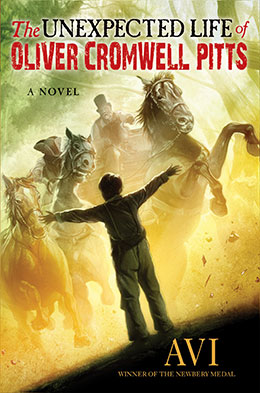A look into 18th Century England, the criminal world young Oliver Cromwell Pitts becomes embroiled in, and one of Britain’s most notorious “thief-catchers,” who was a master thief. It’s a story written in the style of eighteenth century stories by Fielding, Sterne, and others—great fun.

Behind the story
In 18th Century England, there were no professional police forces. Thieves were to be apprehended by citizens, and brought to magistrates for trial. If convicted, a citizen would be rewarded by large sums of money. No surprise, professional “thief-catchers” came into being. read more
Resources
For your trivia games, I believe this is my book with the longest title: The Unexpected Life of Oliver Cromwell Pitts: Being an Absolutely Accurate Autobiographical Account of My Follies, Fortune, and Fate
Interview with From the Mixed-Up Files, Amber J. Keyser
Radio interview with Sive Kelliher (age 12), Colorado Matters, Colorado Public Radio
Five things to like about this book from Greg Pattridge, middle grade teacher
Articles to inspire discussion
“Jonathan Wilde, The Thief-Taker General,” Ciaran Conliffe, Head Stuff, 25 January 2016
“Reading Restoration and 18th Century English Literature,” MJ Booklover, Read Great Literature, 20 February 2021
What happens next?
Spoiler Alert! The sequel to The Unexpected Life of Oliver Cromwell Pitts is The End of the World and Beyond. Convicted of thievery and transported from England to America, Oliver Cromwell Pitts, shackled to his fellow prisoners, endures inedible food, filthy conditions, and deadly storms on his voyage across the Atlantic. But the hazardous shipboard journey is nothing compared to the peril that waits for him on the colonial shores. In Annapolis, Oliver’s indentured servitude is purchased by the foul, miserly Fitzhugh, who may have murdered another servant. On Fitzhugh’s isolated tobacco farm, Oliver’s only companion is an enslaved boy named Bara. Oliver and Bara become fast friends with one powerful goal: to escape Fitzhugh.
